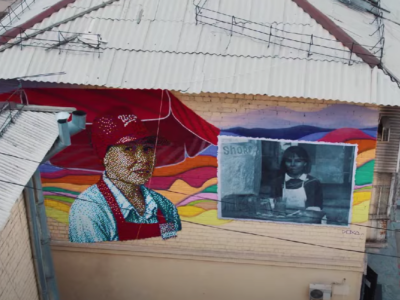This post is part of our special coverage Caucasus Conflict Voices.
Nearly 15 years after a ceasefire agreement put the conflict between Armenia and Azerbaijan over the disputed territory of Nagorno Karabakh on hold, a lasting peace remains elusive and few citizens of either country have the opportunity to meet or communicate with the other. That might be all set to change, however, with DOTCOM, a project funded by the U.S. State Department's Bureau of Educational and Cultural Affairs and implemented by Project Harmony.
Bringing together 90 American, Armenian and Azerbaijani teenagers aged 14-16, participants will use online tools such as blogs to “create socially conscious media that will impact communities across the U.S. and the Caucasus.” Global Voices Online briefly spoke to DOTCOM Program Director Elizabeth Metraux earlier today.
The hope for students in DOTCOM is that they'll acquire the skills and confidence to engage in meaningful discourse about subjects that matter. Students have a lot to say about conflict and poverty and human rights and education. DOTCOM is designed to teach students how to use social media to inspire change on those critical issues.
With negative stereotypes of the other perpetuated by the national media in both countries, the task won't be easy, but blogs by some of the participants are already starting to appear online. Even if separated by closed borders and ceasefire lines, they will at least be able to glimpse into each other's lives albeit on the Internet until 10 of the teenagers from each country will meet in the United States in July.
The blogs have only just been set up and the number of posts are presently at a minimum, but Global Voices Online wishes the project success and hopes to produce regular roundups of content as more entries appear. Meanwhile, although there might be many obstacles to overcome and some which might even prove insurmountable, 15-year-old Edita from Armenia offers a glimmer of hope.
Through DotCom, I would like to see a new project developed where we can discover the cross cultures and lifestyles of Americans and Azerbaijanis for Armenian young people. It gives an opportunity of cultural unification.
Writing on the blog of Dilara, a 14-year-old girl from the Azerbaijani capital, Baku, another young Armenian participant, 15-year-old Nare, leaves a similar comment.
Hi Dilara:))) Glad to meet you:) I'm from Armenia and I want to know more about Azerbaijan!!! I think it will be very interesting to work together:)))
15-year-old Samira also hopes to find new friends through the project.
I like to keep touch with different people. One of the main reason that i joined to this project that i'll find a lot of friends there, to learn the secrets of media deeply. i love to read articles about the culture of foreign countries. i believe that i'll learn a lot of things in this project.
Another Azeri participant, 16-year-old Samir from Baku, expresses a similar hope.
I think it's important to strengthen the relations among the countries,to stop conflicts among countries and to develop the cultural and scientific ties.
DOTCOM's main website is at: http://dotcom.ph-int.org and has a Facebook Group here. A blog set up to present different modules to participants can also be found here while many of their blogs are listed on the profile pages of the Armenian and Azerbaijani program managers.
This post is part of our special coverage Caucasus Conflict Voices.







17 comments
Thanks.Very interesting article.
I think that its very important to make friends with each other, and I hope that we can work well all together, and make friends with each other… :-)
hi there.. this is a very interesting article and great to know young people are blogging about peace issues in Armenia-Azerbaijan – regions which do not get much attention in mainstream news.
I’m curious to know if the young people are given any sort of training/workshops to blog and create an online community not only in their region but globally as websites are global?
I’d like to learn about this as the organisation I work with trains young people in India on how to produce,edit and distribute their own media about their own issues. I would like to move into the online space as that’s what the project http://www.ch19.org is doing..and blogging is of course, an essential part of knowledge-sharing and information!
Thanks for stopping by Srbuko. Looking forward to reading your posts.
And the same with your blog too, Nikolay.
BTW: I noticed from it that you like France and its language.
This post is also available in French:
http://fr.globalvoicesonline.org/2009/01/28/1665/
:-)
I think this is a great initiative, especially because its done among young people.
And because its done online, it will connect many young people.
I would really like to see the outcomes of this initiative once it really gets going…
Thank you for an interesting article.
Hi Onnik. What can I say?:-)I am absolutely agree with all commentators. Ruchika, please do let me know if you learn something on that:-)I am interested.
Many thanks for the article.